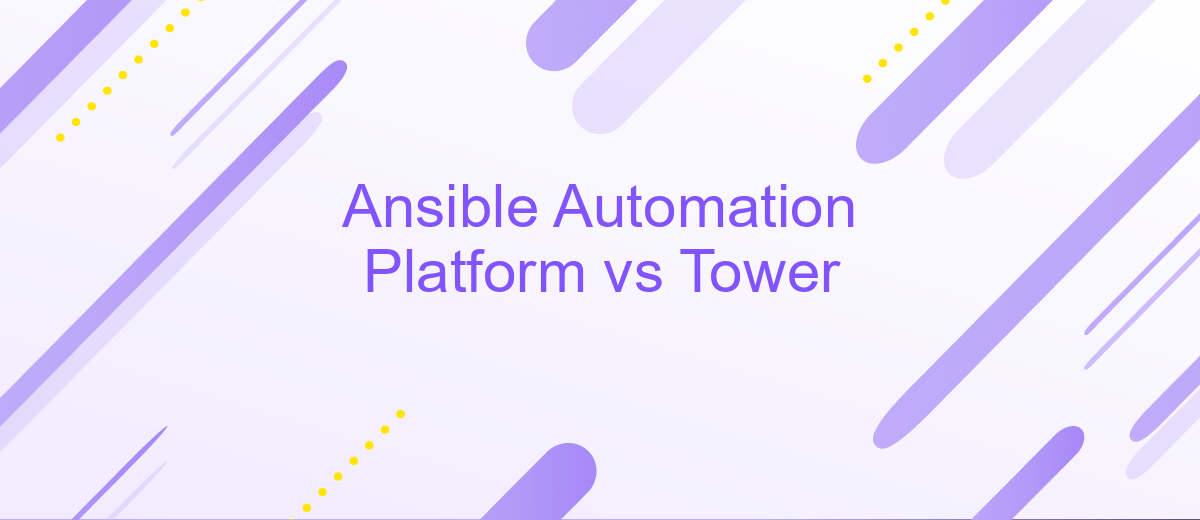Ansible Automation Platform vs Tower
In the rapidly evolving landscape of IT operations, automation tools are indispensable for enhancing efficiency and consistency. Two prominent solutions in this arena are the Ansible Automation Platform and Ansible Tower. This article delves into a comparative analysis of these tools, exploring their features, benefits, and use cases to help you determine which solution best fits your organizational needs.
Overview
Ansible Automation Platform and Ansible Tower are both crucial tools for automating IT tasks, but they serve different purposes and offer distinct features. The Ansible Automation Platform is a comprehensive suite designed to facilitate the automation of complex workflows, integrating various tools and technologies to streamline processes. On the other hand, Ansible Tower acts as a centralized control system for managing Ansible projects, providing a user-friendly interface and advanced features for scheduling, monitoring, and controlling automation tasks.
- Ansible Automation Platform: Comprehensive suite for complex workflows.
- Ansible Tower: Centralized control system for managing Ansible projects.
- Integration: Both tools integrate seamlessly to enhance automation capabilities.
- User Interface: Tower offers a more user-friendly interface for managing tasks.
- Advanced Features: Tower includes scheduling, monitoring, and control features.
In summary, while the Ansible Automation Platform provides a broad range of tools for automating intricate workflows, Ansible Tower focuses on offering a centralized, user-friendly environment for managing these tasks. Together, they form a powerful combination that enhances the efficiency and effectiveness of IT automation.
Key Features

Ansible Automation Platform provides a comprehensive suite of tools for automating IT processes, enabling users to manage configurations, deploy applications, and orchestrate workflows across various environments. It includes powerful features like role-based access control, which ensures that users have the appropriate permissions to execute tasks, and a centralized dashboard that offers detailed analytics and reporting. Additionally, the platform supports a wide range of modules and plugins, allowing for seamless integration with existing systems and third-party services.
On the other hand, Ansible Tower, a component of the Ansible Automation Platform, focuses on enhancing the user experience with a web-based interface, real-time job status updates, and a robust API. It simplifies complex automation tasks and provides a scalable solution for managing large-scale deployments. Ansible Tower also supports integration with services like ApiX-Drive, which facilitates the automation of data flows between various applications, further streamlining processes and reducing manual intervention. Together, these features make Ansible Tower an essential tool for efficient and effective IT automation.
Benefits

When comparing Ansible Automation Platform and Tower, it's essential to understand the unique benefits each brings to the table. Both tools are designed to streamline and optimize IT automation, but they cater to slightly different needs and use cases.
- Comprehensive Automation: Ansible Automation Platform offers a complete suite for automating complex workflows, making it ideal for large-scale enterprises.
- Enhanced User Experience: Tower provides a user-friendly interface that simplifies the management of Ansible tasks, making it accessible even for those with minimal coding experience.
- Scalability: Both platforms support scaling, but Ansible Automation Platform is particularly robust for handling extensive, enterprise-level environments.
- Integration Capabilities: Tower integrates seamlessly with various third-party tools, enhancing its flexibility and utility in diverse IT ecosystems.
- Security Features: Both platforms offer advanced security features, but Tower includes additional role-based access controls to ensure secure and compliant operations.
Ultimately, the choice between Ansible Automation Platform and Tower depends on your specific requirements. Whether you need an all-encompassing automation solution or a user-friendly interface for managing tasks, both tools provide significant advantages that can enhance your IT operations.
Use Cases

Ansible Automation Platform and Ansible Tower serve distinct but complementary roles in IT automation. The Ansible Automation Platform provides a comprehensive suite for automating IT workflows, including provisioning, configuration management, and application deployment. It is designed for enterprises that require scalable automation capabilities across various environments.
Ansible Tower, on the other hand, acts as a centralized control layer for managing Ansible Automation Platform tasks. It offers a user-friendly interface, role-based access control, and real-time job monitoring, making it ideal for teams that need to streamline their automation processes and improve collaboration.
- Automating repetitive IT tasks
- Managing complex multi-tier deployments
- Ensuring compliance and security through consistent configurations
- Facilitating DevOps practices with continuous integration and delivery
- Enhancing visibility and control over automation workflows
In summary, the Ansible Automation Platform is suited for organizations looking to implement robust, scalable automation across diverse environments, while Ansible Tower provides the necessary tools for managing, monitoring, and optimizing these automation efforts. Together, they offer a powerful solution for achieving efficient, reliable IT operations.
Pricing
When evaluating the pricing of Ansible Automation Platform versus Tower, it's important to consider the overall value each solution offers. Ansible Automation Platform typically provides a more comprehensive suite of tools aimed at enterprise-level automation, which can be reflected in its pricing structure. This platform often includes features such as advanced analytics, role-based access control, and enhanced security measures, which can justify its higher cost for organizations needing robust automation capabilities.
In contrast, Ansible Tower, now integrated into the broader Automation Platform, offers a more focused set of features aimed at simplifying the management of Ansible projects. For smaller teams or organizations with less complex needs, Tower might present a more cost-effective option. Additionally, integrating with services like ApiX-Drive can streamline various automation workflows without significant additional costs, making it an attractive option for those looking to enhance their automation capabilities without a large investment. Ultimately, the choice between these solutions will depend on the specific needs and budget constraints of the organization.
FAQ
What is the primary difference between Ansible Automation Platform and Ansible Tower?
Can I use Ansible Tower without subscribing to the Ansible Automation Platform?
Is there a free version of Ansible Tower available?
How can I integrate Ansible Automation Platform with other tools and services?
What kind of support is available for Ansible Automation Platform users?
Time is the most valuable resource in today's business realities. By eliminating the routine from work processes, you will get more opportunities to implement the most daring plans and ideas. Choose – you can continue to waste time, money and nerves on inefficient solutions, or you can use ApiX-Drive, automating work processes and achieving results with minimal investment of money, effort and human resources.

